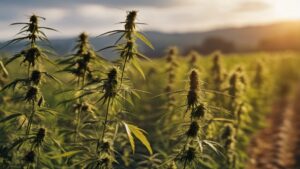
Reducing The Carbon Footprint
Steve DeAngelo, one of the most recognized cannabis activists of the last decades, says that hemp has the ability to replace virtually any petroleum product.
“Hemp can be grown without pesticides. Captures 22 tons of atmospheric carbon per hectare. It is a powerful phytoremediator that extracts industrial poisons from contaminated soil. And, likewise, it is a powerful tool to control erosion and remedy unproductive or marginally productive lands,” says DeAngelo. And adds: “We are only now harnessing the industrial hemp plant’s potential as a rotating crop with regenerative agriculture qualities.”
The Textile Industry
Hemp fabric has been around for a long time, from Rembrandt’s canvases to the sails in Columbus’s caravels. Now, the textile industry is strongly experiencing hemp’s disruption, especially as a replacement for cotton.
The material can be processed to be lightweight, soft, breathable, and durable, replacing most cotton applications in the textile industry. Considering that cotton represents 43% of all fibers used for clothing and textiles worldwide, hemp has huge possibilities ahead.
For instance, iconic jeans company Levi’s recently announced a pilot project to replace 27% of its denim’s cotton with hemp, as part of an overall sustainability push. Why? Cotton requires much more water, pesticides, and soil to be grown than hemp.
It is estimated that cotton accounts for 10% of pesticide use and 25% of insecticides globally, while hemp, due to its resilience, requires very few chemicals to grow. To be precise, one hectare of hemp can produce three times more clothing than one of cotton. This is because the industrial use fibers are extracted from the stem of the hemp plant, which is thin and grows tall, allowing growers to have about 15 plants per square meter.
Numerous luxury hotel chains have also joined the hemp frenzy, and hemp fashion brands have partnered with influencers like Bella Thorne to further spread their vision.
Patagonia, the premium mountain clothing brand, launched a line of garments made of hemp as part of its sustainable efforts as well.
Construction and Plastics
Hempcrete, concrete made with hemp and lime, is lighter and more resistant to fire, mold, and moisture than regular concrete. “It can be made as strong as ordinary concrete and captures atmospheric carbon as it dries,” adds DeAngelo. Furthermore, it can be used without structural purposes, as a thermal and acoustic insulator.

BMW also uses hemp plastics in several of its electric car models, including the i3 and i8, but they are not pioneers: in 1941, Henry Ford presented a car model whose body was built entirely from hemp plastic and ran on cannabis biofuel.
Hemp plastic has endless uses, including bags, boxes and, unlike synthetic plastics, it is produced from renewable and biodegradable materials. Packaging industry giants such as Sonoco Products, Constantia Flexibles, O. Berk, Klöckner Pentaplast and MG America have already declared their interest in the material.
Biofuel

In addition, the rest of the hemp biomass can be used to produce ethanol, a key alcohol in the creation of biofuels, which is traditionally extracted from corn or sugar cane. A 2010 study from the University of Connecticut showed that hemp oil has a 97% conversion rate to diesel.
Although it takes approximately 50% more biofuel to generate the same energy as that produced by petroleum, hemp fuel is a renewable alternative and doesn’t harm the environment. Thus, with the development of a large-scale production chain, the costs of hemp biofuel production will definitely exceed those of oil. However, the latter’s availability inevitably tends to be scarce.
Article originally published here by Natán Ponieman and Javier Hasse







